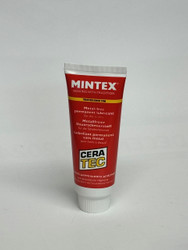Brake Lubricants - Cera-Tec
Posted by Vagbremtechnic on 15th Jan 2024
Brake lubricants play an integral role in the brake replacement process, despite often being an inexpensive item. Certain substances, such as those containing copper, can negatively impact a vehicle's braking system performance and longevity. It is important for mechanics to understand the potential issues associated with different lubricants.
All reputable garage technicians will agree that replacing brakes can be a time-consuming process. A common complaint from customers after a brake job is noise or judder issues with the newly installed brakes, which can be particularly frustrating for mechanics despite meticulous efforts to thoroughly clean the braking system and conduct all necessary checks.
The root cause could lie with the type of lubricant used within the system or the condition of the grease. It is not uncommon to observe an open tin of copper-based lubricant, such as copper slip, left exposed on a mechanic's workbench. If airborne dirt or moisture contaminates the lubricant in this state, it will become ineffective, potentially resulting in braking problems.
To avoid these types of issues and ensure the use of a grease suited for effective braking performance, choosing a copper-free product is recommended. There are several disadvantages to using a copper-containing substance in brakes, sufficient to discourage its use altogether. Firstly, lubricants containing copper cannot withstand high temperatures, preventing the brake pads from moving freely and potentially causing drag and premature wear. Copper can also react with steel and aluminium, increasing the risk of corrosion where these metals meet. This could explain difficulty removing a wheel from the hub on occasion.
A further concern with copper grease is its impact on modern braking technologies, as vehicles increasingly incorporate sophisticated ABS, ESP and EPB systems. As copper is conductive, its presence in the braking system could interfere with the magnetic sensors within these electronic control units. This may result in ABS malfunctions, warning lights, or potential wheel locking issues during braking. Excessive brake disc run-out is another potential issue, as copper lubricants may contain foreign bodies like metal particles when left exposed. The maximum acceptable run-out is 0. mm, which should always be tested with a dial test indicator gauge prior to completing a brake job to ensure safe braking performance. Copper-based greases are also damaging to the environment due to copper being a non-biodegradable metal that can contaminate soils, plants, and animals.
The advantages of using a lubricant without metal particles, such as Cera-Tec, are clear. Firstly, it can withstand the high temperatures within a braking system, allowing the brake pads to move freely without causing issues such as drag or wear that could affect braking performance and lifespan. As a non-conductive grease absent of metal particles, it can be used on vehicles equipped with electronic braking technologies.
VBT now supplies Cera-Tec lubricant with all disc brake and pad replacement kits, big brake upgrade kits, and brake conversion components available from their website, ensuring mechanics have access to a high-quality lubricant suited for modern braking systems.

